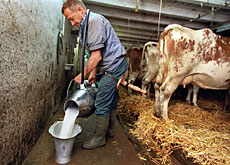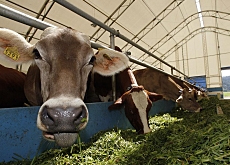Striking dairy farmers urged to wait

A German-led movement of dairy delivery strikes to force an increase in the price of milk is spreading to Switzerland.
Hundreds of Swiss farmers have begun strike action, but the body representing milk producers told swissinfo talks are underway with retailers and processors to raise prices and that negotiations remain the best solution.
Industrial action began in Germany on Tuesday, with producers hoping to earn €0.43 (SFr0.7) per litre, instead of the €0.28- 0.34 they currently make, to match rising production costs.
The action has spread to Austria, the Netherlands, Belgium and now Switzerland. In western Switzerland around 100 producers voted on Wednesday to strike for 48 hours, and in canton Zurich another 200 producers delivered almost no milk for one day.
The fact that the strike has spread to Switzerland is partly out of solidarity with European milk producers. Big-M, the union that called for industrial action, is a member of the European Milk Board.
But Big-M also says Swiss farmers have plenty to be angry about, with production costs outweighing what they are paid now. “Farmers are very motivated and hope that the movement will gather more momentum,” said co-president Martin Haab.
Universal problems
But the Swiss Farmers’ Association says that even if rising inflation in recent months is affecting the producers’ bottom line, it advises against taking industrial action while talks are underway to solve the situation locally.
“Agricultural problems do not have borders, we all have the same problems,” Jacques Bourgeois, director of the Swiss Farmers’ Association, told swissinfo.
“But at the moment we are holding talks with the Swiss milk producers’ association, which is attempting to negotiate prices. So we think that we should wait for the outcome of these discussions.
“We are also dealing with a perishable product. This product needs to be delivered or taken elsewhere and used for other measures, like helping the poor. It should not be thrown away.”
He added that Switzerland’s federalist structure meant it was difficult to create large-scale solidarity for strike action among the country’s 30,000-strong milk producers.
Angry farmers
Talks between retailers, processors and the producers are being coordinated by the producers’ association, which hopes to reach an agreement on an increase per litre between SFr0.7 to SFr1.
Association spokesman Christoph Grosjean-Sommer said farmers could expect to be better off in the second half of the year.
“It’s our responsibility to find a way through negotiations to reach a higher price for dairy farmers. Some months ago we all recognised that production costs were increasing rapidly,” he told swissinfo.
Swiss retailers currently sell pasteurised milk cheaper than in neighbouring countries, he noted.
Grosjean-Sommer pointed out that if production costs were higher than what processors were prepared to pay, it was a problem also being experienced in other countries. But this shouldn’t stop farmers from making their voices heard.
“Dairy farmers have to put more pressure on processors and retailers to sell dairy products for a price they can live on,” he said. “The strikes are a very important sign that farmers are angry.
“But we prefer to negotiate dairy prices and as long as we are in talks we won’t take any further measures,” he added.
swissinfo, Jessica Dacey
A record volume of milk was produced in Switzerland in 2007. More than three million tonnes was produced, a slight increase on the previous year and 26,000 tonnes more than the previous record in 2001.
But the number of dairy farmers in Switzerland is on the decrease. It has nearly halved over the past two decades, falling from more than 57,000 producers in 1986 to 28,830 in 2007. The number dropped by 4% in 2007.
Switzerland’s dairy farmers are among 60,000 who receive direct payments from the state. Last June parliament decided to gradually open up the agriculture market by scrapping subsidies and the changes are expected to come into force in 2009.
The Swiss Milk Producers’ Association is trying to reach an agreement on raising the price of milk by around SFr1 per litre.
Four major firms process 80% of the Swiss milk and two big retailers sell 75% of products to consumers.
Swiss pasteurised milk is cheaper than in neighbouring countries but is often more expensive to produce. Rising inflation is affecting producer costs such as animal feed and lowering producer profits. Meanwhile processors have reported record results, said the Swiss Milk Producers’ Association.

In compliance with the JTI standards
More: SWI swissinfo.ch certified by the Journalism Trust Initiative












You can find an overview of ongoing debates with our journalists here . Please join us!
If you want to start a conversation about a topic raised in this article or want to report factual errors, email us at english@swissinfo.ch.